Book contents
- Frontmatter
- Contents
- List of illustrations
- Acknowledgements
- 1 Introduction
- 2 Killing the god: the afterlife of Cook's death
- 3 Mutineers and beachcombers
- 4 Missionary endeavours
- 5 Trade and adventure
- 6 Taking up with kanakas: Robert Louis Stevenson and the Pacific
- 7 Skin and bones: Jack London's diseased Pacific
- 8 The French Pacific
- 9 Epilogue
- Notes
- Index
9 - Epilogue
Published online by Cambridge University Press: 31 October 2009
- Frontmatter
- Contents
- List of illustrations
- Acknowledgements
- 1 Introduction
- 2 Killing the god: the afterlife of Cook's death
- 3 Mutineers and beachcombers
- 4 Missionary endeavours
- 5 Trade and adventure
- 6 Taking up with kanakas: Robert Louis Stevenson and the Pacific
- 7 Skin and bones: Jack London's diseased Pacific
- 8 The French Pacific
- 9 Epilogue
- Notes
- Index
Summary
We have no means to live.
(Paul Theroux, The Happy Isles of Oceania)One hundred years after Gauguin the island cultures of the South Pacific survive although in many cases their existence remains precarious, threatened by rising ocean levels, nuclear contamination and neo-colonial dependence on foreign aid. Many of the western views of the Pacific examined in this book have also survived. Geopolitically it continues to be seen as empty water. This was apparent in the French government's recent defence of its resumption of nuclear tests on Moruroa Atoll, and the British government's support for this policy. Implicit in the statements of both governments was a view of the South Pacific as an almost vacant ocean thinly populated by peoples who counted for very little. Oceania continues to be regarded as a space rather than a place.
The various traditions of cultural representation examined in this book have also persisted. Sylvia Townsend Warner's beautifully ironized version of this discourse, Mr Fortune's Maggot (1927), is a rare exception. For most of the twentieth century the Pacific has continued to be seen as exotic or debased. The interdependence of these superficially contrasting terms is made clear in Paul Theroux's The Happy Isles of Oceania: Paddling the Pacific (1992). Like Loti, Theroux is a wounded romantic in search of cure or distraction.
- Type
- Chapter
- Information
- Representing the South PacificColonial Discourse from Cook to Gauguin, pp. 265 - 268Publisher: Cambridge University PressPrint publication year: 1997

